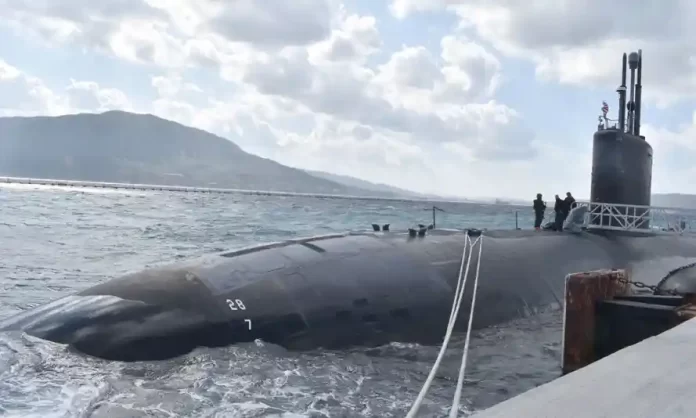Australia’s decision to build nuclear submarines will isolate Australia from its regional neighbours who have, for decades, pursued a nuclear-free Pacific, the International Campaign to Abolish Nuclear Weapons (Ican) has said.
While the Australian government and defence force have insisted the submarines will be nuclear-powered, and never nuclear-armed, Ican, the winner of the 2017 Nobel Peace Prize, argues that a military nuclear reactor built in Adelaide was a “foot in the door” towards weapons development.
“As the world is moving towards making these weapons illegal, this is the wrong direction at the wrong time,” Gem Romuld, Australia Director of Ican, told Guardian Australia.
Pacific anti-nuclear campaigners have reacted with disapproval, while the New Zealand government says Australia’s nuclear submarines will be banned from its nation’s waters.
Romuld said the decision to build and operate nuclear submarines, part of the broader Aukus security alliance announced by the U.S, UK and Australia on Thursday, had “no social licence”. She also warned it could make Adelaide a target for attack.
“This is not something the Australian people have agreed to,” she said.
“Important questions remain over construction of the submarines and the potential imposition of military nuclear reactors on Adelaide or other cities, making construction sites and host ports certain nuclear targets.
“Military nuclear reactors in Australia would present a clear nuclear weapons proliferation risk and become potential sites for nuclear accidents and radiological contamination long into the future.”
The Guardian understands Australia does not plan to build the submarines’ nuclear reactors domestically. Instead, the reactor modules would be delivered, sealed, to Australia from either the U.S or the UK, where they would be installed into the vessels.
But Romuld said the nuclear submarine decision was “alarming” because it represented an escalating nuclearisation of Australia’s military capabilities; increasing military ties with nuclear weapons powers the UK and U.S; and a “shift towards nuclear interoperability at a time when the world has moved towards making these weapons illegal”.
In January this year, a global treaty on the prohibition of nuclear weapons (TPNW), came into force, outlawing parties to the treaty from developing, testing, producing, possessing, or stockpiling nuclear weapons.
It is not supported by any of the world’s nine nuclear-armed states. Australia, also, does not support the treaty, relying on the deterrent effect of the U.S “nuclear umbrella”.
Australia, however, is a party to the Treaty of Rarotonga, which establishes a nuclear weapons free zone in the South Pacific.
Prime minister Scott Morrison said the Aukus security alliance, and the adoption of nuclear submarines, was not a step towards nuclear weapons development.
“Let me be clear, Australia is not seeking to acquire nuclear weapons or establish a civil nuclear capability.
“And we will continue to meet all our nuclear non-proliferation obligations.”
A joint statement from Morrison, U.S president Joe Biden, and UK prime minister Boris Johnson, said: “the development of Australia’s nuclear-powered submarines would be a joint endeavour between the three nations, with a focus on interoperability, commonality, and mutual benefit”.
“Australia is committed to adhering to the highest standards for safeguards, transparency, verification, and accountancy measures to ensure the non-proliferation, safety, and security of nuclear material and technology.”
The chief of the Australian defence force, General Angus Campbell, said Australia’s “commitment to our obligations under the non-proliferation treaty are absolute”.
But Romuld argued Australia adopting nuclear-powered submarines “abandons the direction that our neighbours are taking in pursuing non-nuclear armed peace and stability in the region”.
“We note that the prime minister has clearly stated that this move does not signal future consideration of nuclear weapons. But he must match this with action – Australia must sign and ratify the TPNW now – to not do so leaves the door open for a future stealthy slide towards nuclear weapons.”
New Zealand has already said Australia’s nuclear-powered submarines will be banned from its waters. Wellington has maintained a ban on nuclear-powered vessels since 1985, a response to French nuclear testing in the Pacific.
“New Zealand’s position in relation to the prohibition of nuclear-powered vessels in our waters remains unchanged,” New Zealand prime minister Jacinda Ardern said.
Across the Pacific, where thousands live daily with the legacy of nuclear testing and disposal of nuclear waste, there was disappointment.
Reverend James Bhagwan, the general secretary for the Pacific Conference of Churches, said: “Shame Australia, Shame. How can you call us your ‘vuvale’ when you know your ‘family’ stands for a nuclear-free and independent Pacific?”
Ralph Regenvanu, Vanuatu’s former foreign minister and current opposition leader, said of Australia’s decision: “We continue to be disappointed. And more fearful for our Pacific future”.
Three weeks ago, to mark international day against nuclear tests, the Fijian prime minister Frank Bainimarama told a regional forum the threat of nuclear proliferation remained a “clear and present danger”.
“A nuclear-free Blue Pacific must remain our legacy,” he said.
SOURCE: THE GUARDIAN/PACNEWS













